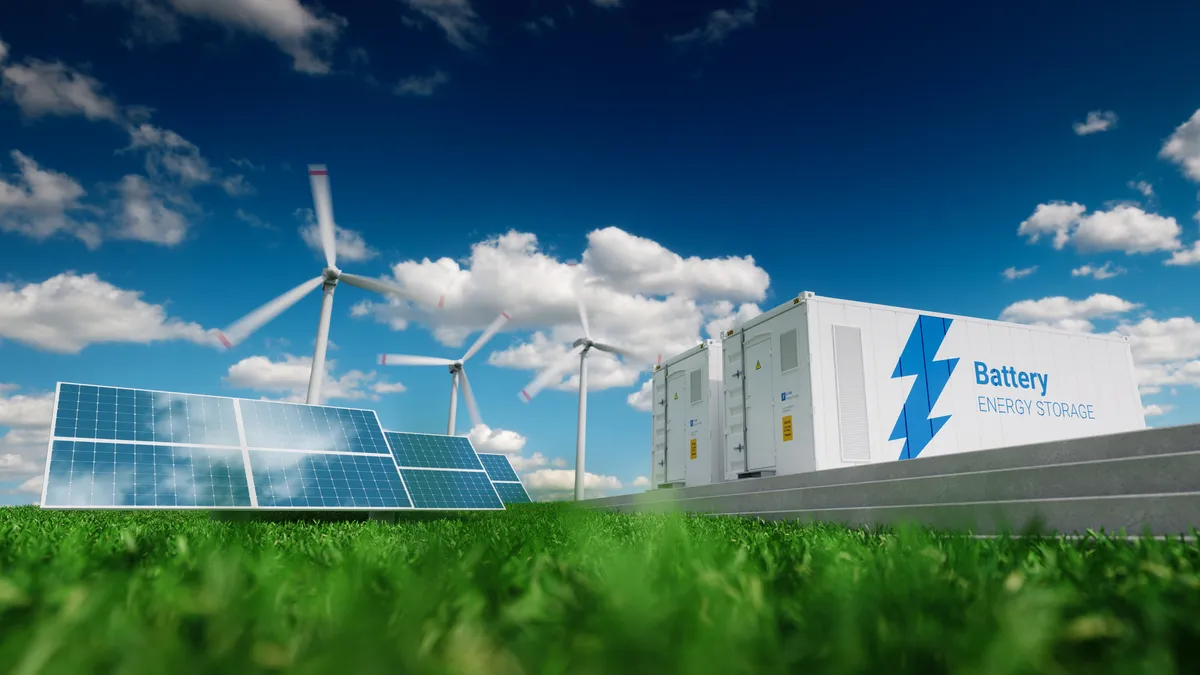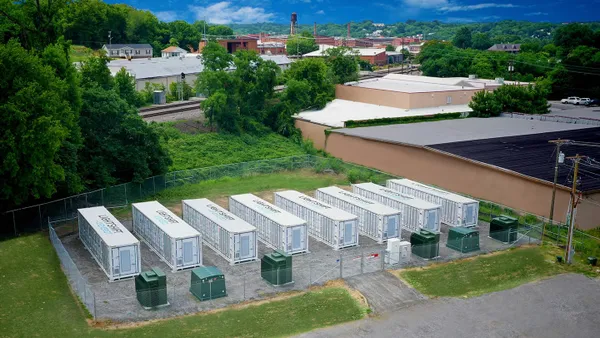Dive Brief:
- Fluence Energy contracted for 600 MW of energy storage products in the first quarter of fiscal year 2022 and deployed 1,033 MW despite continued supply chain issues, the company announced Thursday.
- This week, Fluence also announced an agreement with energy firm The AES Corp. to implement the Fluence IQ digital intelligence and analytics platform on a 1.1-GW portfolio of solar and energy storage in Western U.S. states. That represents the single largest deal for the Fluence IQ platform and helped Fluence meet its 2022 software deployment target seven months ahead of schedule.
- Fluence has also been eyeing storage installations linked to transmission lines to alleviate transmission bottlenecks, especially in places with offshore wind farms. The company completed a 1-MW pilot with Lithuanian transmission operator Litgrid AB in December 2021, leading to a 200-MW contract.
Dive Insight:
Fluence went public in October in a $1 billion initial public offering, capturing investor and public interest in widespread energy storage deployment to supplement the growth in renewable energy generation on the grid. In its first earning call in December, Fluence touted the potential for $1 billion in revenue this year. CEO Manuel Perez Dubuc said Thursday the early returns this year bear out that potential.
"We are still in the early stages of the renewable energy transition and I can say the future looks bright for Fluence," Perez Dubuc said. He added that the market for storage is "exceptionally strong," especially as customers start to expand existing storage installations.
The 600 MW of energy storage products contracted in the three months ending Dec. 31 was more than five times the total of the same period the previous year. Currently, Fluence has a backlog of 3,217 MW of contracted products — up from 2,679 MW in September 2021 — and nearly 14 GW of energy storage products in the pipeline.
However, Perez Dubuc added, supply chain constraints continue to be a hindrance, which has slowed the rate of installations. The company has expanded its supply chain base and shipping contracts and is also providing additional training for staff to handle the supply chain issues. Additionally, Perez Dubuc said Fluence plans to adapt pricing based on the raw material index, which measures the market for base materials, which he said will minimize the company's exposure to further supply chain issues.
A November analysis from BloombergNEF forecast that the global storage market could reach 358 GW/1,028 GWh by 2030, buoyed by falling battery prices and a rapid growth in renewables, which rely on storage to deliver power at times of lower generation.
Fluence is seeking to capture that market, with new deals announced in India, Australia and Lithuania. In January, Fluence announced a 50-50 joint venture with Indian renewable firm ReNew Power to expand energy storage in the Indian market, starting with a 150-MWh battery to support a 300-MW renewable generation project. The Indian government has forecast a need for at least 27 GW/108 GWh of storage by 2030; currently, Fluence accounts for more than half of the country's installed storage.
Rebecca Boll, Fluence's chief product officer, said on Thursday's call that the company is continuing to explore new segments and opportunities for storage, like the transmission line pilots or working with overseas data centers. There is "potential" for expansion into the residential storage market, but Boll said no concrete plans exist yet.
The AES deal also represents a large expansion of Fluence's IQ platform, which uses artificial intelligence to optimize pricing and market opportunities for energy storage and generation assets. The platform is already available on the California Independent System Operator market and will be expanded to a portfolio of more than 1 GW of solar and energy storage projects across the Western U.S. under the deal.
Fluence was started by AES and Siemens in 2018.
"By implementing and utilizing cutting-edge automated bidding software for our projects, we will be able to improve grid reliability and efficiency while also supporting our customers' green energy transitions in a safe and reliable way," Leo Moreno, AES Clean Energy president, said in a statement.














